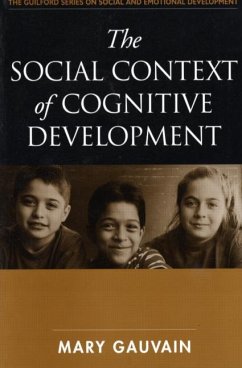
The Social Context of Nonverbal Behavior

PAYBACK Punkte
24 °P sammeln!
This volume presents, in an integrated framework, the newest, most contemporary perspectives on the role of nonverbal behavior in social interaction. The book includes empirically-grounded work and theories that are central to our understanding of the reciprocal influences between nonverbal behavior and social variables. In doing so, it contributes to the on-going controversy now shaping the field regarding the degree to which nonverbal behavior represents social, as opposed to biological, forces. The volume also highlights a number of recent subareas in the domain of nonverbal behavior that h...
This volume presents, in an integrated framework, the newest, most contemporary perspectives on the role of nonverbal behavior in social interaction. The book includes empirically-grounded work and theories that are central to our understanding of the reciprocal influences between nonverbal behavior and social variables. In doing so, it contributes to the on-going controversy now shaping the field regarding the degree to which nonverbal behavior represents social, as opposed to biological, forces. The volume also highlights a number of recent subareas in the domain of nonverbal behavior that hold much promise, including the role of nonverbal behavior in group membership and media influences on nonverbal behavior. The proposed volume also presents data and theories that have applied value, useful to people working in such fields as communication, psychotherapy, and counseling. Finally, the volume gathers contributors in different sub-fields that are rarely presented jointly, such family and media socialization factors.
Table of contents:
1. Introducing nonverbal behavior within a social context Pierre Philippot, Robert S. Feldman and Erik J. Coats; 2. Cultural influences on nonverbal expressions of emotion Cenita Kupperbusch, David Matsumoto, Kristie Kooken, Sherry Loewinger, Hideko Uchida, Carinda Wilson-Cohn and Nathan Yrizarry; 3. Option or obligation to smile: the effects of power and gender on facial expression Marianne LaFrance and Marvin A. Hecht; 4. Emotional displays and dissemblance in childhood: implications for self-presentation Carolyn Saarni, Hannelore Weber; 5. Family expressiveness: a retrospective and new directions for research Amy G. Halberstadt, Valerie W. Crisp and Kimberly L. Eaton; 6. The influence of television on children's nonverbal behavior Erik J. Coats, Robert S. Feldman and Pierre Philippot; 7. Group membership and the decoding of nonverbal behavior Gilles Kirouac and Ursula Hess; 8. Mimicry: facts and fiction Ursula Hess, Pierre Philippot and Sylvie Blairy; 9. Facial expression and emotion: a situationist view Jose-Miguel Fernandez-Dols; 10. Facial behavior alone and in the presence of others Hugh Wagner and Victoria Lee; 11. The social and emotional functions of facial displays Antony S. R. Manstead, Agneta H. Fischer and Esther Jakobs; 12. The evolution of parallel process model of nonverbal behavior Miles L. Patterson; 13. Conflict issues and conflict strategies as contexts for nonverbal behavior in close relationships Judith A. Feeney, Patricia Noller, Grania Sheehan and Candida Peterson; 14. Love's best habit: deception in the context of relationships D. Eric Anderson, Matthew E. Ansfield, Bella M. DePaulo.
This volume presents, in an integrated framework, the newest, most contemporary perspectives on the role of nonverbal behavior in social interaction. The book includes empirically-grounded work and theories that are central to our understanding of the reciprocal influences between nonverbal behavior and social variables.
A series of essays, written by experts from around the world, on the role of nonverbal behavior in everyday social interaction.
Table of contents:
1. Introducing nonverbal behavior within a social context Pierre Philippot, Robert S. Feldman and Erik J. Coats; 2. Cultural influences on nonverbal expressions of emotion Cenita Kupperbusch, David Matsumoto, Kristie Kooken, Sherry Loewinger, Hideko Uchida, Carinda Wilson-Cohn and Nathan Yrizarry; 3. Option or obligation to smile: the effects of power and gender on facial expression Marianne LaFrance and Marvin A. Hecht; 4. Emotional displays and dissemblance in childhood: implications for self-presentation Carolyn Saarni, Hannelore Weber; 5. Family expressiveness: a retrospective and new directions for research Amy G. Halberstadt, Valerie W. Crisp and Kimberly L. Eaton; 6. The influence of television on children's nonverbal behavior Erik J. Coats, Robert S. Feldman and Pierre Philippot; 7. Group membership and the decoding of nonverbal behavior Gilles Kirouac and Ursula Hess; 8. Mimicry: facts and fiction Ursula Hess, Pierre Philippot and Sylvie Blairy; 9. Facial expression and emotion: a situationist view Jose-Miguel Fernandez-Dols; 10. Facial behavior alone and in the presence of others Hugh Wagner and Victoria Lee; 11. The social and emotional functions of facial displays Antony S. R. Manstead, Agneta H. Fischer and Esther Jakobs; 12. The evolution of parallel process model of nonverbal behavior Miles L. Patterson; 13. Conflict issues and conflict strategies as contexts for nonverbal behavior in close relationships Judith A. Feeney, Patricia Noller, Grania Sheehan and Candida Peterson; 14. Love's best habit: deception in the context of relationships D. Eric Anderson, Matthew E. Ansfield, Bella M. DePaulo.
This volume presents, in an integrated framework, the newest, most contemporary perspectives on the role of nonverbal behavior in social interaction. The book includes empirically-grounded work and theories that are central to our understanding of the reciprocal influences between nonverbal behavior and social variables.
A series of essays, written by experts from around the world, on the role of nonverbal behavior in everyday social interaction.












